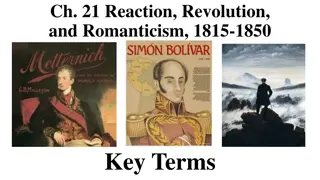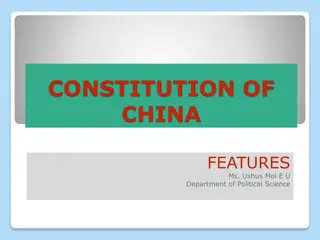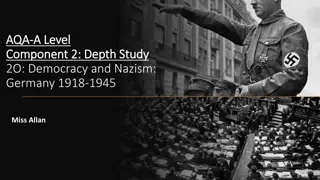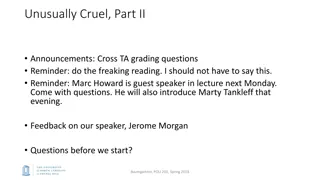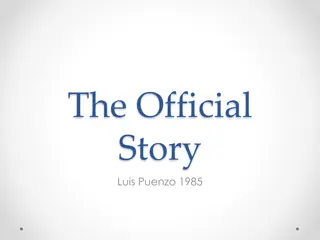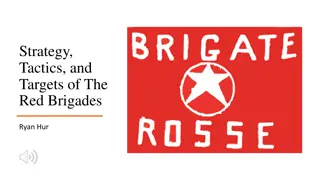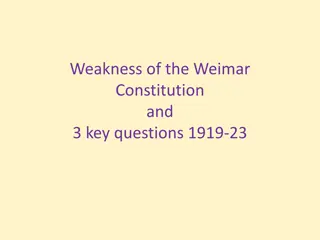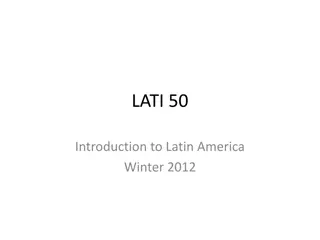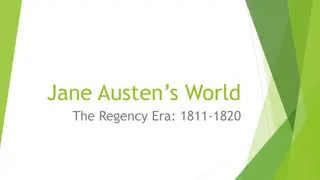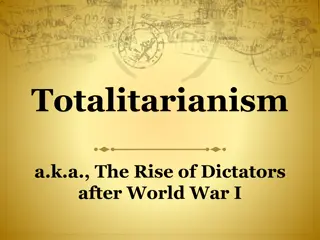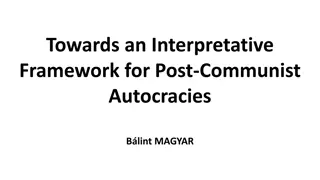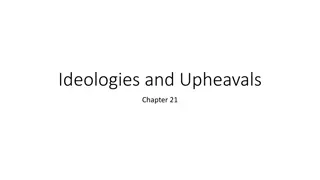French Revolution
Explore the transformative period of the French Revolution, starting with the Noble Revolt in 1787 and leading to the rise of a Radical Republic, the Terror of 1793-1794, and the eventual establishment of a Napoleonic Dictatorship. Learn about the key events, influential figures like Toussaint L'Ouv
4 views • 4 slides
Dive into the Vibrant World of Nishkam History Department
Immerse yourself in the enriching experience offered by the Nishkam History department, where academic rigor meets a growth mindset. Meet the passionate teachers and delve into a curriculum covering fascinating topics like the Early Stuarts, Civil Rights in the USA, and Democracy and Dictatorship in
0 views • 13 slides
Key Terms in Ch. 21: Reaction, Revolution, and Romanticism, 1815-1850
The key terms discussed in Chapter 21 include principle of legitimacy, balance of power, ideology, conservatism, principle of intervention, ultraroyalists, ministerial responsibility, and liberalism. These terms highlight important political philosophies and concepts during the post-Napoleonic era a
0 views • 17 slides
Features of China's 1982 Constitution
The 1982 Constitution of China, drafted after extensive discussions, adheres to socialist principles and emphasizes the socialist system as the foundation of the state. With a total of 138 Articles, it is a flexible document allowing for easy amendments and maintains a unitary system with centralize
2 views • 13 slides
Understanding Democracy and Nazism in Germany (1918-1945) - A Level History Depth Study
Delve into the complex history of Germany from 1918 to 1945, focusing on the transition from democracy to Nazism. Explore key events like the rise of the Nazi Party, Hitler's dictatorship, and the impact of World War Two. Challenge preconceived notions of good and evil while enhancing your analytica
1 views • 12 slides
Understanding the Importance of Checks and Balances in Federalist Essays
James Madison's Federalist Essays, particularly Federalist 51, emphasize the necessity of a strong government with checks and balances to prevent abuse of power. The essays explore human nature, the need for control over the governed, and the role of government in preventing anarchy and dictatorship
0 views • 12 slides
Themes and Symbols in Lord of the Flies
Explore the themes of the fall of man, man's savage nature, violence, friendship, obedience, peer pressure, democracy vs. dictatorship, and symbols like the conch, Piggy's glasses, face paint, the beast, and fire in the classic novel "Lord of the Flies" by William Golding. The story delves into the
0 views • 9 slides
Criminal Justice Sentencing and Drug Policies in Baumgartner's POLI 203 Course
Announcements include upcoming guest speakers and reminders. Discussions cover motivated reasoning, victim focus versus defendant focus, and appropriate sentences for various crimes. The historical forms of sentencing in the US are explored, along with drug sentencing policies in Portugal post-dicta
0 views • 8 slides
Understanding Different Forms of Government
An institution known as government establishes and enforces rules for a group of people. This institution must possess sovereignty, legitimacy, and jurisdiction. Various forms of government exist, such as dictatorship, absolute monarchy, and constitutional monarchy, each with distinct characteristic
0 views • 12 slides
The Rise and Rule of Leaders in Russia: Marx, Lenin, and Stalin
The journey of political upheaval in Russia, from the writing of the Communist Manifesto by Marx and Engels to the rule of Lenin and the dictatorship of Stalin, marked by revolution, famines, purges, and the Great Terror.
0 views • 13 slides
The Official Story (1985): A Masterpiece of Argentine Cinema
Luis Puenzo's film "The Official Story" is a significant piece of Argentine cinema that delves into the country's turbulent history during the Dirty War. The movie, set in the aftermath of a dictatorship, offers a poignant portrayal of Argentine society through the character of Alicia, a middle-clas
0 views • 4 slides
The Red Brigades: Strategy, Tactics, and Targets
The Red Brigades operated with the strategy of establishing a dictatorship of the proletariat through armed propaganda and violent actions to overthrow the state. Their tactics involved calculated political terrorism and politically motivated kidnappings and murders, avoiding mass casualties. Initia
0 views • 5 slides
Weaknesses of the Weimar Constitution and Key Questions 1919-23
The Weimar Constitution had strengths such as democratic PR but weaknesses like Article 48 leading to dictatorship vulnerability. Additional weaknesses included a right-wing bias and a Republic dominated by anti-Republican personnel. The period also saw a revolution in 1918 due to military defeat. T
0 views • 12 slides
Rise and Reign of Napoleon Bonaparte: The Napoleonic Era 1799-1815
Explore the rise to power and reign of Napoleon Bonaparte, from his military achievements to becoming Emperor of France. Witness the pivotal moments like the coup d'état, establishment of the French Consulate, and his coronation. Discover Napoleon's reforms and impact during the Napoleonic Era.
0 views • 24 slides
Napoleon Bonaparte: Rise to Power and Rule of France
Napoleon Bonaparte, born in 1769 in Corsica, rose to become a successful military leader and eventually seized power in France through a coup d'état in 1799. He ruled as the first consul, implementing reforms and establishing his authority. Napoleon's rule saw the creation of the Napoleonic Code an
0 views • 36 slides
The Rise and Reign of Napoleon Bonaparte (1799-1815)
Napoleon Bonaparte's ascent to power from military general to Emperor of France during the Napoleonic Era marked by coups, reforms, and controversial coronation. His reign brought significant reforms to economy, society, and religion, focusing on economic stability, social order, religious freedoms,
0 views • 26 slides
Exploring Latin America: A Cultural Journey Through History and Society
Delve into the rich tapestry of Latin America through the course "Introduction to Latin America" in Winter 2012. The course covers various dimensions from magical realism to economic development, democracy to dictatorship, social inequality to popular culture. Engage with the paradoxes of this vibra
0 views • 10 slides
Insights into Jane Austen's World During the Regency Era (1811-1820)
Discover the societal dynamics, extravagance, widening class gaps, social hierarchy, and the impact of the Napoleonic Wars on Jane Austen's world in the Regency era. Explore her keen observations of human behavior and the contrasting lifestyles of different social classes during this transformative
0 views • 8 slides
The Rise of Totalitarianism and Charismatic Dictators Post-World War I
Totalitarianism emerged as charismatic dictators rose to power in Italy, Germany, and Russia after World War I. The Lost Generation, disillusioned by the war, contributed to the vulnerability of people seeking new beliefs. Features of totalitarianism included one-party dictatorship, an all-powerful
0 views • 16 slides
Evolution of Women's Political Rights in Greece: A Historical Overview
The journey of Greek women to gain suffrage rights, from the first municipal elections in 1934 to prominent figures entering Parliament in the 1950s and beyond. Key milestones include the feminist movement, the struggle for equality, and the election of the first woman MP and mayor. The narrative cu
0 views • 25 slides
Framework for Understanding Post-Communist Autocracies
The illusion of linear progress towards liberal democracies post-1989-1990 revolutions is challenged by the complex reality of post-communist autocracies. This framework explores the characteristics of democracy, autocracy, and dictatorship to categorize regimes, highlighting the challenges and nuan
0 views • 41 slides
Political Education in Post-Transition States: The Case of (East-)Germany
Examining the evolution of political education in Germany, this study focuses on the transition from dictatorship to democracy and its impact on citizen engagement. Comparisons between East and West Germany post-WWII shed light on the differing approaches to political education, highlighting the imp
0 views • 25 slides
Ideologies and Upheavals: Congress of Vienna and Impact
The Congress of Vienna, a gathering of key European powers, aimed to establish lasting peace after Napoleon's defeat. Key agreements included territorial compensation, restoration of monarchs, and the formation of the Holy Alliance. While successful in preventing major wars, the Congress lacked fore
0 views • 19 slides


